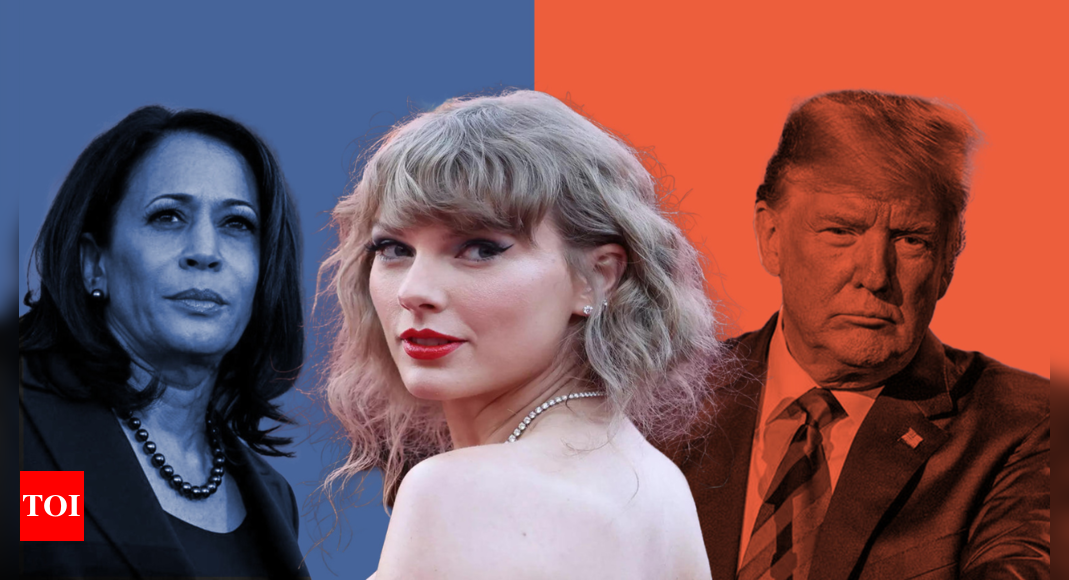
Taylor Swift’s ‘Eras’ tour, which began in March 2023, has drawn comparisons to a presidential campaign due to its reach and impact, spanning multiple states and drawing large crowds.
However, the current reason Swift is now being mentioned in political conversations is due to her recent endorsement of Vice President Kamala Harris in the 2024 presidential race, which has sparked widespread attention and analysis, as reported by The New York Times.
The endorsement, made on Instagram, quickly stirred up news coverage and analysis regarding Swift’s potential influence on the campaign.
Swift’s endorsement, posted on Instagram, came after months of speculation. In her post, she explained her support for Harris, writing, “She fights for the rights and causes I believe need a warrior to champion them. I think she is a steady-handed, gifted leader and I believe we can accomplish so much more in this country if we are led by calm and not chaos.”
Following the endorsement, a New York Times, Philadelphia Inquirer, and Siena College poll conducted between September 11 and 16 found that 44 per cent of likely voters had a favourable opinion of Swift, while 34 per cent viewed her unfavourably.
The poll also revealed that Swift’s endorsement has sharply divided voters along party lines, with 70 per cent of Democrats expressing favourable views of the singer compared to 23 per cent of Republicans.
Notably, former President Donald Trump was among those critical of Swift. Over the weekend, he posted on Truth Social, declaring, “I HATE TAYLOR SWIFT!” This statement further highlighted the partisan nature of Swift’s political influence.
According to the same poll, 47 per cent of voters view Trump favorably, with 51 per cent holding an unfavorable opinion of him. Harris is viewed favorably by 48 per cent of voters, with 49 per cent viewing her unfavorably.
Before her endorsement, Trump had shared AI-generated memes falsely suggesting Swift supported him. In her Instagram post, Swift addressed the spread of misinformation, saying, “The simplest way to combat misinformation is with the truth.”
Interestingly, 22 per cent of voters said they were unsure of how they felt about Swift, with this group being older, especially men over the age of 65.
However, the current reason Swift is now being mentioned in political conversations is due to her recent endorsement of Vice President Kamala Harris in the 2024 presidential race, which has sparked widespread attention and analysis, as reported by The New York Times.
The endorsement, made on Instagram, quickly stirred up news coverage and analysis regarding Swift’s potential influence on the campaign.
Swift’s endorsement, posted on Instagram, came after months of speculation. In her post, she explained her support for Harris, writing, “She fights for the rights and causes I believe need a warrior to champion them. I think she is a steady-handed, gifted leader and I believe we can accomplish so much more in this country if we are led by calm and not chaos.”
Following the endorsement, a New York Times, Philadelphia Inquirer, and Siena College poll conducted between September 11 and 16 found that 44 per cent of likely voters had a favourable opinion of Swift, while 34 per cent viewed her unfavourably.
The poll also revealed that Swift’s endorsement has sharply divided voters along party lines, with 70 per cent of Democrats expressing favourable views of the singer compared to 23 per cent of Republicans.
Notably, former President Donald Trump was among those critical of Swift. Over the weekend, he posted on Truth Social, declaring, “I HATE TAYLOR SWIFT!” This statement further highlighted the partisan nature of Swift’s political influence.
According to the same poll, 47 per cent of voters view Trump favorably, with 51 per cent holding an unfavorable opinion of him. Harris is viewed favorably by 48 per cent of voters, with 49 per cent viewing her unfavorably.
Before her endorsement, Trump had shared AI-generated memes falsely suggesting Swift supported him. In her Instagram post, Swift addressed the spread of misinformation, saying, “The simplest way to combat misinformation is with the truth.”
Interestingly, 22 per cent of voters said they were unsure of how they felt about Swift, with this group being older, especially men over the age of 65.









